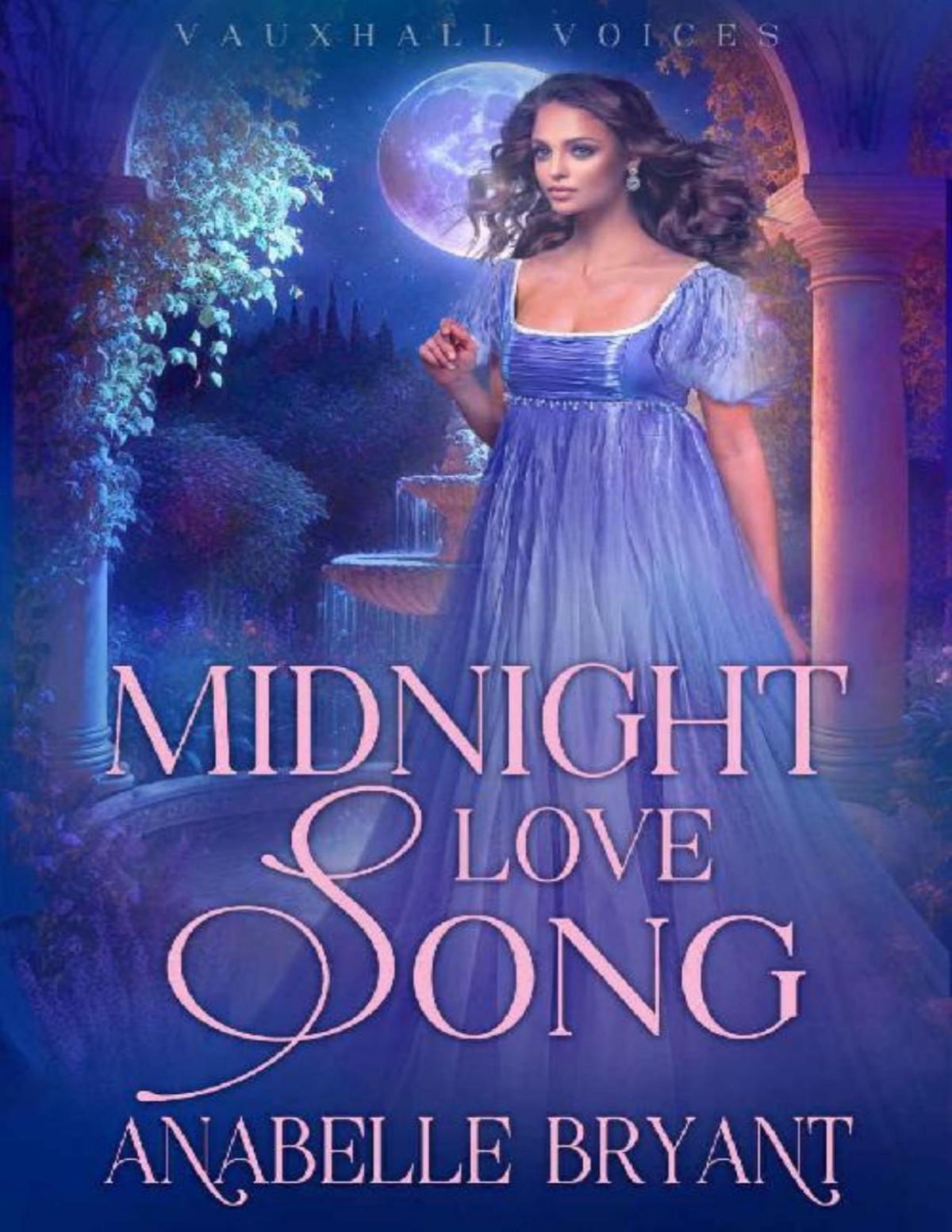A Love Song for Ricki Wilde Tia Williams
Visit to download the full and correct content document: https://ebookmass.com/product/a-love-song-for-ricki-wilde-tia-williams/
More products digital (pdf, epub, mobi) instant download maybe you interests ...
Song for a Cowboy Sasha Summers
https://ebookmass.com/product/song-for-a-cowboy-sasha-summers/
Song for a Cowboy Sasha Summers
https://ebookmass.com/product/song-for-a-cowboy-sasha-summers-4/
Song for a Cowboy Sasha Summers
https://ebookmass.com/product/song-for-a-cowboy-sasha-summers-2/
Song for a Cowboy Sasha Summers
https://ebookmass.com/product/song-for-a-cowboy-sasha-summers-3/
Song for a Cowboy Sasha Summers
[Summers
https://ebookmass.com/product/song-for-a-cowboy-sasha-summerssummers/
Midnight Love Song (Vauxhall Voices Book 3) Anabelle
Bryant https://ebookmass.com/product/midnight-love-song-vauxhall-voicesbook-3-anabelle-bryant/
Song for a Cowboy Sasha Summers [Summers
https://ebookmass.com/product/song-for-a-cowboy-sasha-summerssummers-2/
Must Love Football (Sweetheart Shorts Book 6) Lacy
Williams https://ebookmass.com/product/must-love-football-sweetheartshorts-book-6-lacy-williams/
Must Love Stargazing (Sweetheart Shorts Book 2) Lacy
Williams
https://ebookmass.com/product/must-love-stargazing-sweetheartshorts-book-2-lacy-williams/
This book is a work of fiction. Names, characters, places, and incidents are the product of the author’s imagination or are used fictitiously. Any resemblance to actual events, locales, or persons, living or dead, is coincidental.
Copyright © 2024 by Tia Williams
Cover design by Sarah Congdon. Cover photograph © 2023 Hachette Book Group/by Adrian McDonald. Cover copyright © 2024 by Hachette Book Group, Inc.
Hachette Book Group supports the right to free expression and the value of copyright. The purpose of copyright is to encourage writers and artists to produce the creative works that enrich our culture.
The scanning, uploading, and distribution of this book without permission is a theft of the author’s intellectual property. If you would like permission to use material from the book (other than for review purposes), please contact permissions@hbgusa.com. Thank you for your support of the author’s rights.
Grand Central Publishing Hachette Book Group
1290 Avenue of the Americas, New York, NY 10104 grandcentralpublishing.com twitter.com/grandcentralpub
First Edition: February 2024
Grand Central Publishing is a division of Hachette Book Group, Inc. The Grand Central Publishing name and logo is a trademark of Hachette Book Group, Inc.
The publisher is not responsible for websites (or their content) that are not owned by the publisher.
The Hachette Speakers Bureau provides a wide range of authors for speaking events. To find out more, go to hachettespeakersbureau.com or email HachetteSpeakers@hbgusa.com.
Grand Central Publishing books may be purchased in bulk for business, educational, or promotional use. For information, please contact your local bookseller or the Hachette Book Group Special Markets Department at special.markets@hbgusa.com.
Library of Congress Cataloging-in-Publication Data
Names: Williams, Tia, 1975- author.
Title: A love song for Ricki Wilde / Tia Williams.
Description: First edition. | New York : Grand Central Publishing, 2024.
Identifiers: LCCN 2023036601 | ISBN 9781538726709 (hardcover) | ISBN 9781538726723 (ebook)
Subjects: LCGFT: Romance fiction. | Novels.
Classification: LCC PS3623.I566 L68 2024 | DDC 813/.6— dc23/eng/20230818
LC record available at https://lccn.loc.gov/2023036601
ISBNs: 9781538726709 (hardcover), 9781538726723 (ebook)
E3-20231108-JV-NF-ORI
Contents
Cover
Title Page
Copyright Dedication
Prologue
Chapter 1: Botany Flowers Lately
Chapter 2: Night-Blooming Jasmine
Chapter 3: Carolina Shout
Chapter 4: Mysterious Benefactor
Chapter 5: Your Vibe Attracts your Tribe
Chapter 6: Sexy Sepia Shenanigans
Chapter 7: Tragic or Romantic?
Chapter 8: Stroke of Genius
Chapter 9: Things Could Get Dangerous
Chapter 10: Night Company
Chapter 11: A Beacon for the Lost
Chapter 12: Flower Shower
Chapter 13: Transcendent and Ruinous and Soulmate-Perfect
Chapter 14: Everywhere and Nowhere
Chapter 15: You’re the Bee’s Knees, Breeze
Chapter 16: Chronologically Premium
Chapter 17: Bw + Ff
Chapter 18: Little Spooned
Chapter 19: The Forrest Gump of Music
Chapter 20: Sex Break
Chapter 21: The Witches of Eastwick
Chapter 22: Burying a Grudge
Chapter 23: A Love Song for Ricki Wilde
Epilogue
Acknowledgments
Discover More
Reading Group Guide
Discussion Questions
Author Q&A
About the Author
Also by Tia Williams
For my eighth grade English teacher, Mr. Marchese, at Osterholz American Junior High School in Osterholz, Germany. He told me I was destined to write novels, and I believed him.
Explore book giveaways, sneak peeks, deals, and more.
Tap here to learn more.
BOTANY FLOWERS LATELY
June 11–21, 2023
Twenty-eight-year-old Ricki Wilde possessed many talents. She could spot the chicest fashions in the jankiest thrift stores. She refurbished furniture beautifully. She collected interesting words (like “interrobang”: the combination of an exclamation point and a question mark, used to express dismay). Plus, she cooked exquisite cannabis candy and, within three notes, could pinpoint the exact year of any pop, R&B, or hip-hop song in history.
But Ricki was terrible at one very important thing. Being a Wilde.
As the youngest member of an illustrious family dynasty—the Wildes of Wilde Funeral Homes Inc., the national chain founded in 1932—Ricki knew that her family thought she was an Unserious Person. Her only resemblance to the Wildes was her face, which was a carbon copy of those of her socialite sisters, Rashida, Regina, and Rae. (Each born a year apart, they were frequently referred to as Rashidaginarae.) But where her sisters were long-stemmed roses, Ricki, younger than Rae by fifteen years, was a dandelion. A bloom that looked like a flower but was really a weed: born to erupt into fluff, floating wherever the wind blew.
Tonight was the Wildes’ Sunday dinner. But it wasn’t just dinner. It was her family’s weekly business meeting. No husbands, kids, or tardiness permitted. Ricki parallel parked hastily at the foot of the driveway and flew
up the steps to the front door of her parents’ Buckhead, Atlanta, estate. Hastily, she checked the time on her phone. She was four minutes early—a first! Usually, Ricki sprinted in as the first course was served, sputtering apologies. Her lateness was sometimes excused (I-75 traffic), but usually not (a risky one-night stand holding her hostage in a trailer). Either way, it was never forgotten.
Tonight, Ricki had to be on her best behavior. For once, she had important news to share. Life-changing, game-changing news.
Quickly, she checked her reflection in the glass inset in the door. She needed to feel powerful, true to herself, which translated into a ’70s halter dress, ’60s gold platforms, and ’80s dolphin hoops, all thrifted from her favorite consignment shops. She fluffed her shoulder-length twist-out and smiled.
Perfect, she thought with ballsy defiance. You are a strong, confident woman with a brilliant business plan and a bright future ahead. You are you, and you are enough.
Upon further reflection, she removed her septum piercing.
And then, calling upon the posture she’d learned at Beauregard School of Etiquette (integrated by her mom, class of ’68), Ricki straightened her shoulders and swept into the house.
The rest of the Wildes were already seated in the grand dining room, cocktailing and chatting.
“… but, Regina, no one gets caught for tax evasion anymore,” her mother, Carole, was saying as Ricki rushed in. Ricki’s father, Richard, paused mid–sip of wine to sigh at his youngest child. Her sisters’ Botoxed brows, none of which had moved a millimeter in a decade, struggled to frown in disapproval.
Ricki slid into her chair. The table was elegantly plated for the first course, a light gazpacho prepared by James, her parents’ longtime butler. Spiffy in a walnut-colored suit, James matched the dark wood and chintz upholstery of the dining room. He dutifully refreshed everyone’s glass except for Carole’s, as she chugged vodka neat from a Hamilton tumbler that the whole city pretended contained water. Then Ricki greeted her family.
“Hi, Mom. Hi, Dad.” Ricki smiled brightly at her parents and then nodded tersely in her sisters’ direction. “T-Boz, Chilli, Left Eye.”
Rashida shot daggers at her.
“What’d I miss, y’all?” asked Ricki, with more enthusiasm than she’d ever shown at Sunday dinner.
“Forget what you missed. Why are you dressed like every member of Sister Sledge?” asked Regina. Like Rashida and Rae, she wore crisp, colorless designer separates and a swingy silk press. The Rashidaginarae uniform.
“It’s obscene, wearing used clothes when everyone knows we have money,” scoffed Rae, who’d never forgiven Ricki for replacing her as the baby.
“Now, girls, don’t count coins at the table,” slurred Carole, diamonds twinkling at her earlobes. She was already toasted.
“She’s just so zany, Mother,” groaned Regina. “We all know these costumes are just a distraction from her exhausting personality.”
“I’m not zany,” said Ricki, stealing a roll from her mom’s plate. “I’m idiosyncratic.”
Her whole life, Ricki’s sisters had roasted her for being too flighty, too messy, too much—and she pretended not to care. But it secretly stung. It plagued her, the fear that her personality would test the patience of everyone she knew.
“Girls, let your sister be,” fussed Carole. Once extravagantly pretty, she now had the disoriented look of a prom queen stranded in the wilds of her midseventies with no ride home. “She looks like me, way back when. Though I never exposed my bosom. I always say, ‘To look your best, don’t lead with breasts.’”
“I’ve never heard you say that,” said Regina.
“Well, you’re flat as paper,” said Carole, swirling the ice in her tumbler.
Richard Wilde Sr., an impeccably suited gentleman who was not a debauched megachurch pastor but looked like one, stayed silent. A millionaire CEO, TED Talk king, and New York Times bestselling author of the iconic business book Till Death: Monetizing the Inevitable, Richard talked for a living but was a man of few words at home. The less he gave, the hungrier his family was for his attention. Especially his oldest daughters, who each owned several Wilde Funeral Homes franchises and were in competition to be the family’s next greatest business mind.
Ricki did not own a franchise. She didn’t own anything of her own. Yet.
“Back to business,” said Rashida. “As I was saying, I’m swamped this week. My designer and I have been finalizing the interiors of my new house. Massive undertaking…”
“Are you using Baylor Washington this time?” asked Regina.
“No one uses him after he did that former reality star’s rental.” Rashida’s voice lowered to a whisper. “Rhymes with BeBe Reakes.”
Carole yelped.
“Anyway,” Rashida continued, “despite being booked and busy, I just signed the contract on our first Pass Away Café!” She beamed proudly. “Now we can discuss final plans with grieving families over fruit tarts and cognac-spiked lattes.”
Ricki paused midbite. “The brunchification of death, Rashida? Really?”
Rashida tossed her hair. “It’ll be a nippy day in hell when I take business notes from a receptionist who barely graduated from a state school.”
“I’m not a receptionist, okay? My official title is director of first impressions.”
Technically, they were both correct. Ricki was the director of first impressions at Wilde Funeral Homes’ flagship property on Peachtree Street, and it was, indeed, a fancy synonym for “receptionist.” Suffice it to say, Ricki’s life hadn’t unfolded the way it was supposed to. Like her sisters, Ricki was meant to graduate with an Ivy League business degree, excel in an entry-level position at Wilde’s, work her way up to a customer-facing role, and finally, open her own franchise—at which point she’d be awarded a weighty trust fund. But from the moment of her accidental conception, Ricki had never followed the plan set out for her.
When it came to the Wilde Funeral Homes businesses, all Ricki ever cared about was one thing: the flowers. The bouquets, the branches, the petals. The fantastical sprays. Growing up, her one respite from the rigidity of the Wildes—and the chilly business of dying—was the wooded garden a mile or so beyond their estate. She’d bask languorously in the crisp, dewsoaked grass, burying her fingers in the soil and dreaming of her own nonsensical, perfect world. She’d plant every seed she could find, coaxing life to spring from the earth. She’d trudge home, breathless, in pollendusted shortalls with dirt-encrusted fingernails and grass-strewn hair, and Carole, horrified, would escape to her bedroom suite and speed-dial her therapist.
Little Ricki had her head in the clouds, lost in fairy-tale scenarios so vivid that, till she was twelve years old, she’d whisper to herself in her imaginary friends’ voices. This did not bode well for real friendships. And her dreaminess didn’t translate into business success at Wilde Funeral Homes, either. Hence her career trajectory. The receptionist salary was abysmal, but it paid for her one-bedroom rental and used car. It was fine. Her life was small.
Ricki had acquaintances, but close friends? Nope. She was too scared to drop her guard. Dating was easy, though, due to her attraction to hot, shallow guys who weren’t super concerned with who she was, beyond being a pretty Wilde. She’d even been engaged three times before coming to her senses and bolting.
Real intimacy—platonic, romantic, or sexual—paralyzed her. What if people saw what the Wildes saw? That she was a joke? Her family had mythologized her black sheep personality. But Ricki wanted to create her own mythology. To stand in her own truth, as self-help culture dictated. She’d always felt that her real life was unfolding somewhere else, far away.
She did have an inkling of how to get there, though. Ricki had a dream, one that she’d been obsessing over since she was that dirt-dusted kid in the forest. And unlike most childhood dreams, this one hadn’t faded into memory. It had stuck to her, growing and growing, and she’d been cultivating it at every turn. But she’d never breathed a word of it to her family. Wilde Funeral Homes was the planet around which they orbited. Choosing any other future was akin to sin.
“Ricki, it’s your turn to share business news. We’re waiting with bated breath,” prodded Richard in his mellifluous baritone. Lost in thought, Ricki hadn’t realized her sisters had already shared their updates. She was up next.
“Y’all know she doesn’t have news,” mocked Rashida.
“Unless she’s engaged again,” tittered Regina.
“Remember the fiancé who photoshopped their faces on a stock engagement photo and sold it to the Atlanta Journal-Constitution?” asked Rae, giggling.
“Lord! Don’t speak of it,” sighed Carole, spilling a bit of vodka on her linen sheath. “I could barely show my face at the Orchestra Noir winter ball.”
Rashida snickered. “If only she was as dedicated to work as she was to humiliating us.”
Weary-eyed, Ricki sat silent, disassociating, as her sisters picked her apart, united in their perfection, their smug sameness. If living in this family had taught her anything, it was that compared to Rashidaginarae, she’d never measure up.
Tell them your plan. What you’ve prepared for. Set yourself free.
“I do have news,” she spit out, almost too loud.
Her sisters perked up, looking both suspicious and intrigued.
“What would you think if I… well…” She paused and restarted, adding more gravitas to her voice. “Okay, hear me out. I’d like to open my own shop. A… a flower shop.”
Her words hung in the air for one endless, excruciating moment. From his post against the back wall, James shook his head sadly and exited the room.
“Jesus, send the flood,” whispered Carole, polishing off her fourth vodka tumbler.
“I’ve always wanted a flower shop. My entire life.” And then the details spilled from Ricki like molten lava. “You guys don’t know this, but I create floral designs. It’s my passion! And I’m good. Really good. I actually run a floristry account on Instagram. I kept it secret from you, but… yeah, it has three hundred seventy-two thousand followers. I do a lot of brand partnerships,” she said with hesitant pride. “I made thousands off my last sponsorship with a brilliant cactus artisan.”
Perplexed, Richard looked at Carole. “The hell is a cactus artisan?”
“Ricki, are you on that stuff?” wailed Carole.
“I’m not on drugs, Mom,” sighed Ricki. “I raised enough money through partnerships to afford night school at Chattahoochee Tech. In May, I received a horticulture associate of applied science degree! And I did it while holding down three floral design apprenticeships.”
“Everything you just said sounds poor,” said Rashida.
“I just can’t picture you operating a business,” scoffed Regina. “I’ve seen you crumble in Excel.”
“Think of the optics,” urged Rashida. “You really want to be the sister who failed out of the family business… to sell carnations? This pursuit is silly. We are not silly.”
Ricki snorted. “Sure, Pass Away Café.”
“Dare I ask,” started Richard, all controlled tension, “if you have a business plan?”
“I do!” And she did, but now she was losing confidence, fast. “Sort of? I guess before I shared it, I wanted to get your thoughts on the idea. Your approval.”
“Hold on,” blurted out Rae. “You’re a secret plant-fluencer? What’s your account?”
“It’s called Botany Flowers Lately.”
Rashida blinked. “That’s not a name—that’s a question.”
“It’s a pun,” answered Ricki. And then, because she’d had it up to here, she snapped. “And it’s a fucking good pun! Be happy I decided against ‘I’m Sexy and I Grow It’!”
Incensed, she shot out of her chair. “You know what? Y’all have this rigid idea of what success looks like. Which is fine, but it’s not mine. I don’t want your life. And I’m not cut out for the funeral business. I feel like I’m trying to fit a circle in a square. I feel like I’m disappearing.”
“Why can I hear you at eleven decibels, then?” moaned Carole, gripping her forehead with a dainty hand. She stood up, swaying a tad. “How dare you spit in the face of everything Richard’s done to give us such privilege? I’m going to bed. May God cover you, Rae.”
“Ricki,” corrected Rae.
“Exactly,” she slurred nonsensically. And then James reappeared to escort her away.
“I’ve heard enough.” Rashida rose from her seat. “Ricki, you’ve officially lost it. Good luck, girlboss.”
Regina and Rae hopped up, spun on their heels, and followed Rashida out. Now it was just Ricki and her dad. Calmly, he took one last sip of his wine and faced his youngest daughter. The one he liked the best. His baby, who was supposed to be a boy and be named after him—Richard Wilde Jr. —but, from the start, had refused to follow the path set out for her.
His baby, who, despite being a girl, was named Richard Wilde Jr. anyway because her mother had been fresh out of good female R names.
Wearily, he frowned in her direction.
“Richard,” he started.
“Yes, Richard?”
“I always try to be patient with you. Because of your attention disordered… uh… deficit… disease.”
Ricki’s shoulders slumped. “Thanks?”
“Your sisters are tiresome bitches.”
“I’ve been saying!”
“But they’re right. You’re not savvy enough to build a business. If you were? You would’ve pushed harder to open a funeral home franchise, only to receive your trust fund. Then you could’ve run off with enough capital to invest in five hundred flower shops.”
“I wanted to start with my own money,” she said quietly.
“Commendable.” His voice dripped with the sarcasm of a man who, at age twenty-four, had resuscitated his grandfather’s business with generous mob backing. (Allegedly.)
She continued, wiping her damp palms on her cotton dress. “I love you, Daddy. But I need to start fresh, create my own business, my way. Who knows? Maybe I’ve inherited some of your genius genes.”
Richard cocked his head at her. And then he nodded slowly, revealing the barest hint of a smile. Was it amusement? Incredulousness? Pride?
But then his warmth froze over, replaced by his usual chilly reserve.
“You let things happen to you, Ricki. Too often and too late, you realize you’re in trouble. That’s a dangerous trait, in business and in life.” He frowned. “We’re not alike.”
“I might surprise you, Daddy,” she whispered, a knot forming in her throat.
“Perhaps.” Richard checked his watch. Conversation over. “I’ll accept this as your two weeks’ notice. After that, you’re on your own. Let’s see how much of me is in you.”
Then Richard Wilde Sr. walked out and left Richard Wilde Jr. alone.
A week and a half later, Ricki was in hell.
Her business plan was airtight, but she still hadn’t found a shop location. In three days, she’d be unemployed. And every second working at the
Wilde Funeral Home felt like eternity. An architectural monstrosity, the neo-Mediterranean building boasted terraces, fountains, and a heroic number of cherub angels. It was the perfect place to memorialize your loved ones if you imagined the Great Beyond to be an opulent palace catty-corner to a Trader Joe’s.
Her job was to welcome grieving families into the home and, while they waited for a caseworker, upsell them to hell by suggesting pricey add-ons to their funereal experience. Glam services before the funeral? A Gucci silk casket lining? A paid actor to perform histrionics if the deceased was too unpopular to draw a crowd? Wilde’s had it all.
Obscene. Ricki had never had the stomach for draining clients of their finances in the name of capitalism. And now, with one foot out the door, she was even less inclined to do her job.
Ricki was slumped against a marbled archway at the entrance, chipping off her manicure. Damn-near catatonic with malaise, she barely noticed the woman in front of her.
“Oh!” She immediately straightened up. “Welcome to Wilde Funeral Home,” she robotically recited, “your loved one’s endless resting place of peaceful enchantment.”
The person stepped out of the sun’s glare. She was an elderly woman, dazzling in a linen caftan, oversized white-framed sunglasses, and a tiny silver ’fro. Her hands were trembly and twisted (arthritis, surely), and she was subtly stooped. But otherwise, she projected chic vitality.
“Hello, dear. I’m Della Bennett.”
“Ricki Wilde, ma’am. It’s a pleasure. How may I help you, Mrs. Bennett?”
“Oh, call me Ms. Della. I only have a few minutes—my driver’s parked yonder.” Her voice had that clipped, almost British inflection adopted by upper-crust Southern Black women of a certain age to indicate class. Like Tina Turner and the first Aunt Viv.
She removed her shades, revealing sad, striking eyes surrounded by paper-thin, lined skin. A shadow of pain touched her features. “My husband, Dr. Eustace Bennett, has passed.”
“My condolences, ma’am. I hope he went peacefully.”
“Well, he went ironically.”
“Ma’am?”
“Dr. Bennett was a neurologist specializing in narcolepsy. He died in his sleep.” Bravely, she thrust her chin upward. “My husband always had a lively sense of humor.”
Ricki had seen her share of grieving spouses, from hysterical to elated. Ms. Della obviously loved her husband but wasn’t the type to broadcast her emotions.
“Would you like some tea in our Eternal Slumber Lounge?” If Ricki had truly been good at her job, she would’ve offered her a $125 facial in the Life Is for Living Spa Suite.
Ms. Della declined, saying that the love seat by the archway would do.
Ricki took a seat next to the older woman. “Are you from Atlanta, ma’am?”
“Not originally, but Dr. Bennett was born here. We lived about twenty minutes down Route 75 until a few years ago, when I convinced him to buy up in Harlem. Ever been?”
“I have! We’d stop at Abyssinian Church on the drive up to the Vineyard every summer. I haven’t been since I was fourteen, when I was banned from summering with the family.” She grimaced. “But I love the Harlem Renaissance. Imagine living through that time. The style! The music! The parties.”
“You like to romanticize, I see?”
Ricki smiled. “Guilty. I romanticize everything.”
“Bless your heart.” She patted Ricki’s forearm with a light dismissiveness. “Why were you banned from Martha’s Vineyard?”
“Oh. An incident with my mom’s Porsche. Did you know that wild turkeys attack cars if they see their reflection in the windows?”
“You found out the hard way, I suppose.”
“No, actually I’d read about it in National Geographic, and then I drove into Vineyard Poultry Farm to test it out with local turkeys. They mangled the car door and waddled away without a scratch.” She sighed. “My psychiatrist diagnosed me as ‘terminally curious.’”
“I declare!” Ms. Della pronounced it Idy Claire, like a woman’s name, and then she let out a bell-like, twinkling chuckle.
“So,” started Ricki, “why did you move to Harlem?”
“Hmm. Where does one start?” It struck Ricki that Ms. Della might be the most refined, correct person she’d ever encountered. She wondered if
she’d ever had an improper moment. “It was my dream, I suppose. You see, I’m ninety-six, and…”
“Ninety-six? You?”
“Swim aerobics.” She winked. “Anyway. In my day, women tucked away their own desires to support their husbands. I loved Dr. Bennett more than life, so I was happy to do so.” She clasped her hands together. “He was my sweetheart. Do you have a sweetheart?”
“No, ma’am. I don’t think I’ve ever had one.”
“You will.” She smiled. “To me, love is like listening to an album. Some people skip to their favorite songs and ignore the rest. Other people listen to the entire album over and over, until it’s familiar and cherished and they know every note by heart. That’s how Dr. Bennett and I loved each other. He was music I could listen to forever.”
Ricki blinked at this stranger’s striking face. She’d never experienced love like that, and she’d doubted it existed outside of urban legend. But the way Ms. Della put it, transformative love sounded actually attainable. She wondered if she’d ever find it for herself.
“Dr. Bennett sounds like a wonderful man,” breathed Ricki, enchanted by the older woman. “I can’t imagine how it must feel to love and lose a soulmate.”
“The love doesn’t stop just ’cause he’s gone,” Ms. Della said with careful practicality. “And to answer your earlier question, I’d always hoped to live in Harlem. After living most of my life following Dr. Bennett’s lead, it was time for me to realize my own dream.”
“It’s like that Langston Hughes poem,” said Ricki. “What happens to a dream deferred? Does it dry up like a raisin in the sun?”
Ricki worried her bottom lip with her teeth. The poem used to hang on the wall of her Sunday school classroom. To little Ricki, deferring a dream sounded like torture.
Ms. Della frowned at her, not unkindly. “What’s troubling you, sugar? It looks like you’ve got the blues.”
“Is it that obvious?”
“Well, I know from the blues, myself.” She lowered her voice. “Turbulent moods run in my family, they say.”
“Seriously? You seem so positive, so upbeat.”
“Lexapro,” she divulged. “But how about you? What’s wrong?”
Her gentle presence and precise, direct way of speaking were so soothing to Ricki. But older Black women always melted her. As Ricki was a late-in-life baby, her grandmothers and great-aunts had died before she was born, and she’d always longed for that connection. This woman made her want to spill all her feelings.
“My family owns this business. But it’s not for me. What I’m good at, what I love, has no value here.” She sighed miserably. “I’m a horticulturist.”
Ms. Della’s mouth dropped open. “A whore-to-what, now?”
“No, I’m a HORTICULTURIST,” she pronounced carefully.
“Ah. My hearing. Go on.”
“Flowers, greenery, plants. They’re my life. I want to open my own flower shop. A magical, fragrant space. I want to surround myself with life, not death.” She looked at Ms. Della shyly. “There’s an abandoned shed in the woods, a few miles from my parents’ house. It’s my favorite place on Earth. It’s so old that nature has taken over, with vines and bushes growing wild. I want a shop like that, where the outside converges with the inside. An urban oasis.”
“Sounds real nice, like Eden.” Ms. Della’s eyes softened, and a silent kinship settled between the two of them. It was the first time Ricki had heard anything other than ridicule over her idea. It was thrilling, sharing an instant understanding with a stranger. It felt like relief.
“I’ve been saving half my paycheck for this for years! But the spaces I can afford to rent are all wrong. Too industrial, too modern.” She looked down at her hands. “I just have one chance to prove myself. No one believes in me, and I constantly second-guess myself, but I know I can make this shop a success. You know how some things just make sense?”
“Hmm,” said Ms. Della cryptically. Then she pulled a photograph out of her wallet and passed it to Ricki. “Don’t know if you’re looking to leave the state. But this is my brownstone in Harlem. I live on the top three floors, and there’s a boarded-up ground-floor apartment that’s been empty since the 1920s. Lord knows I don’t know what to do with it.
“Now, this may sound funny, Ricki. But the apartment feels like it’s holding its breath. Just waiting for the right person to bring it back to life. Wouldn’t it make a pretty flower shop?”
Ricki peered down at the photo. Instantly, she felt a physical pull. An
insistent tingle in her chest. Heart thudding, she opened her mouth to speak, but Ms. Della had moved on.
“Now. Shall we discuss old Dr. Bennett’s homegoing?”
Later, Ricki couldn’t recall how she had answered. She just remembered knowing, with certainty, that she’d randomly met her real-life fairy godmother and that she’d felt as dazed and dazzled as if she’d been touched by a magic wand.
Much later still, she’d realize that there was nothing random about it at all.
NIGHT-BLOOMING JASMINE
September 2023–February 2024
In early September, Ricki moved in. It was one of those golden New York afternoons when summer overstayed its welcome. Sunshine trickled through the tree-lined streets, dappling sidewalks and illuminating the city in warmth. The day felt enchanted, and Ricki was home.
225½ West 137th Street. Harlem.
Even the address sounds enchanted, she thought, peering up at Ms. Della’s brownstone for the first time in person.
She’d done her research, and she knew that Ms. Della’s house was near Strivers’ Row, the swanky historic district where Black aristocrats had lived during the Harlem Renaissance. But nothing had prepared her for this breathtaking block of impossibly grand nineteenth-century Italianate brownstones. Just as Ms. Della’s photo suggested, number 225½ was a beautifully restored antique, framed by leafy vines and vibrant wildflowers. To Ricki, a lifelong lover of bygone eras, the entire building felt like a gift delivered through time. Magical.
Ms. Della lived on the top three floors. But on the ground level, to the left of a majestic stoop, was the unoccupied, boarded-up garden apartment. Inside, the large front room with a massive street-facing bay window would house Ricki’s shop. And the small studio apartment in the back would be her home. She hadn’t intentionally manifested this faraway place to hold
her new life, but damned if this wasn’t that.
Before Ms. Della and Dr. Bennett bought the house a few years ago, no one had lived there since 1928. Immediately, they’d had it structurally updated to modern standards, and because Ms. Della loathed clutter, she’d tossed most of the 1920s relics belonging to the last tenants. (“Nostalgia and melancholia are fraternal twins,” Ms. Della had announced to a horrified Ricki.) Thankfully, in the empty garden apartment, Ms. Della had left a few pieces of original furniture covered in muslin, thinking that the person who finally rented the space might like some historic flair.
Holding her breath in anticipation, Ricki opened the creaky front door to the spacious front room. The parquet floors were sagging, the plaster was chipped, and the air was fragrant with sawdust, Lysol, and Febreze, but oh, it was charming. Ricki pulled a dusty piece of muslin off the wall, revealing a rusted pier mirror reflecting sunlight into the space.
She wandered around the room, designing the space in her head. When she got to the windowsill, she peered outside onto 137th Street, imagining what it must’ve been like back when Harlem was the epicenter of Jazz Age glamour. Flappers shimmying in satin, men in spats and hats. The fast, frenzied craze of the Roaring ’20s. The Black mecca!
Not so much today. So far, Ricki had spotted only chic upper-middleclass white families hanging out outside, with UPPAbaby strollers and toddlers. It was the kind of block where Black Lives Matter flags waved from every stoop, but only a few Black lives resided.
Because Ricki was wired to go superhard for anything she cared about, she’d spent the past three months educating herself on Harlem culture. She reread Nella Larsen, Ralph Ellison, and Amiri Baraka. She streamed Moon over Harlem (1939), Hell up in Harlem (1973), and A Rage in Harlem (1991). She read Pat Cleveland’s memoir and bought Van Der Zee prints. She already knew Mase’s Harlem World album by heart, but nevertheless, she streamed it forty-seven times as she packed up her apartment.
Just then, Ricki noticed a note card on the windowsill. DELLA BENNETT was embossed on top in gold, and the note was written in spidery handwriting.
Dear Ricki,
This place was waiting for you. Work your magic. Two conditions upon living here. 1) Pay rent in a timely fashion. 2) Visit your elderly landlady upstairs once a week, for tea and The Great British Bake Off. I hear she’s recently widowed and would enjoy company.
xx DB
Hugging the note to her chest, Ricki spun around, eager to see the rest. In the back of the soon-to-be shop was a door leading to a narrow hallway with a closet-sized bathroom replete with a 1910s-era claw-foot tub. The hall ended with a compact studio apartment featuring a sliver of an oven, a few cabinets, and a sink tucked in a far corner.
The aging floors groaned as she raced around, swiping muslin off furniture, dust catching in the sunbeams streaming through the window. Gasping with delight, she discovered a throne-like dulled-green wingback armchair.
Most spectacularly, she uncovered an antique oak piano and bench.
She’d never seen a square piano before. It was so quaint and oldfashioned looking, like a set piece from Lady Sings the Blues. She slid onto the bench, running her fingers down the well-worn, nicked planes of the oak and then across the ivory keys. With flourish, Ricki did a dramatic roll down the entire keyboard.
There’s such faded glamour in this piano, she mused. Who played it? Whose lives were lived here?
No time to wonder. Ricki had work to do.
After selling her car and three engagement rings—and emptying the savings she’d earned from her brand partnerships—Ricki could afford to cover living and business expenses for six months. Only. Refusing to spend a dime on renovation help, she stripped the floors till her fingers bled. She borrowed a neighbor’s ladder to paint dreamy designs on the ceiling and then toppled from the third step, spraining her ankle. With bandaged fingers, she refurbished that ancient emerald throne into an Instagrammable set piece and, with a pronounced limp, dragged it from her studio to the shop. She awoke at 5:00 a.m. daily, taking the A to the Chelsea Flower District, filling crates with stock she’d use to practice her whimsical designs, ones she’d reproduce in a few months, for actual clients.
The work was fucking grueling. But she’d never had more fun in her life.
Ricki’s grand opening was set for December 1. She had a little over two months to transform the space into an experience, a maximalist fantasy blooming with unexpected treasures. And a fantastic name was key! Sadly, Ricki couldn’t trademark Botany Flowers Lately (apparently one couldn’t “own” a question). Her alternate name was even better: Wilde Things.
Drowning in HGTV-level renovations, Ricki realized she hadn’t had a moment to be a proper flaneuse, which was one of her favorite words. It was such a romantic idea, meandering through the city, taking in new sights and sounds while people-watching, solo-dining, and bookstore-browsing with abandon. (Ricki decided that a flaneuse should project adventurous glamour, which translated into a luxe oversized marigold shawl belted over 1950s men’s trousers—all sourced at neighborhood stoop sales.)
One windy afternoon, after visiting all the touristy spots—Red Rooster, Sylvia’s, the Schomburg, the Apollo—Ricki was perched on a barstool at Lenox Coffee. She was delighted with her solo adventure; she felt warm and satisfied, an independent and self-sufficient business owner. While she was sipping a cortado and studying her receipts from the past week, a peal of laughter erupted from a nearby table. Bright-eyed and cool, the group of twenty-somethings was huddled over a phone, giggling. The sound was infectious, and she smiled, too. Then she stopped.
Wait, why am I smiling? she thought, feeling the beginning, panicked pangs of loneliness. I’m not in on their joke. And those aren’t my friends. Besides Ms. Della, I don’t know anyone here! I’m all alone in the most expensive city in the world, where I’ve decided to open a flower shop on a sleepy residential block where the nearest commercial establishment is a restaurant. Did I think about the fact that I’d be sharing foot traffic with a joint called Sexy Taco? No. Will the same person ordering mezcal and burritos want to buy my frou-frou floral arrangements? PROBABLY NOT. I’ve already failed at one career, and if I fail at this, I’ll be a confirmed
loser. No home, no money, no family, no pride. And yeah. No friends, either.
Had her family been right about her all along? They always expected her to flail, to fail. But despite them, Ricki had never felt like a loser. She simply felt misplaced. Like a duck raised by squirrels. She’d always suspected that given the chance to do what she did best, she’d succeed.
But right now, Ricki was sure of only one thing. She was lonely. Her Wilde Things woes might be easier to swallow if she had friends. In theory, she’d kill to be a part of that coffee shop friend group. But in actuality, the idea of chitchatting her way into a meaningful friendship felt… impossible. Making friends was difficult for Ricki. Her old introverted instincts told her to fold in on herself and, in lieu of actually speaking to other humans, dream up scenarios in the shower where she and some chick would accidentally grab each other’s orders at a cute smoothie spot, and POOF: instant best friend origin story. It was easier than attempting conversation and then watching someone’s polite dismay as they realized her packaging didn’t match her personality.
Ricki’s prettiness was mainstream, unchallenging. She had a sweetly approachable smile and sparkly doe eyes. People expected her to be palatable. Not a woman with paralyzing social anxiety around anyone she hadn’t known for twenty years. A woman who told weird dad jokes when nervous. A woman who, while grasping for appropriate cocktail party chatter, might stress-babble about the latest nightmare fish discovered in the Mariana Trench. Or the Great Molasses Flood of 1919. Or the top five reasons Mark Zuckerberg should be tried for crimes against humanity.
Out of fear of being rejected or embarrassed, she’d always kept people at arm’s length. And it only hurt Ricki in the end. Did people really think she was a goofy disaster, or were her sisters’ voices in her head psyching her out? Either way, it was clearly time to Get Out There.
When she read on Twitter about a networking event for local Black creatives, Ricki jumped on it. So on the evening of November 3, she strode into the Edge, a rustic Jamaican British restaurant on Edgecombe, ready to be social. The vibe was sexy. Afro beats and codfish fritters. A quick study of HELLO MY NAME IS stickers revealed senior directors of this and directors of that. At almost thirty, Ricki was just starting her dream career, but these partygoers had been corporate players for years!
Ricki was wilting. Why did everyone seem to know how to schmooze, be social, be normal, be cool, except for her? Was no one else paralyzed at the thought of unleashing the car crash of their personality on an innocent stranger? Her self-consciousness was a prison.
So she downed two Moscow mules in rapid succession. She shut her eyes and chanted her anxiety app affirmation (I am not in danger, I’m uncomfortable, this will pass, and I am confident). Then she practically threw herself at a friendly-looking woman wearing palazzo pants. Her tag said, LYONNE: SOCIAL MEDIA DIRECTOR, DANCE THEATRE OF HARLEM.
“Not to be awkward,” Ricki shouted awkwardly over the thumping bass, “but what’s your perfume? It’s… so pretty.”
“Sorry, can’t hear! What’d you say?”
Stomach sinking, Ricki repeated herself.
“It’s actually an essential-oil-infused cocoa butter,” said Lyonne. “My boyfriend makes it. I can get you some.”
“Really? Thank you.” And then Ricki self-immolated. “I love cocoa butter. My skin’s so dry I identify as an Eczema American.”
Lyonne gasped. “You’re Mexican American?”
“What? No, I…”
“I just saw a TikTok about this community of Black Mexicans descended from escaped enslaved people. You have a fascinating culture. Come on, diaspora!”
In too deep, Ricki just nodded, cheeks aflame.
“Gr-gracias?” she croaked, her soul leaving her body. “Ummm… I think I’m tipsy. I should go. Great meeting you.”
She raced out of the party, aghast.
But then three miracles happened in rapid succession.
The first miracle was Ali. After her fourth injury (a hammer-bruised thumb), Ricki decided she needed a handyman. Enter Ali, a TaskRabbit hire who built shelves and installed an in-store workspace in forty-five minutes. On the app, he was highly rated for his workmanship.
















